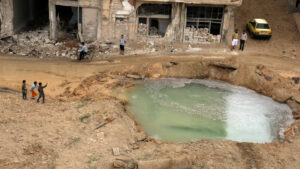Libya Scenes From a Deluge: Floods Devastate Devastated Areas Beyond Control” – this is how the Libyan city of Derna was described when it was hit by a destructive flood that submerged the city, robbed it of its splendor, and claimed thousands of lives. The entire region was declared a disaster zone. In a tragic turn of events, Hurricane Daniel, originating from Greece, unleashed its fury upon the Libyan coast, leaving behind a trail of destruction and a heart-wrenching humanitarian crisis. The world was once again reminded of the increasing frequency and severity of climate disasters. As we grapple with these devastating events, it becomes our collective responsibility to extend a helping hand to those in need and address the broader challenges posed by our changing environment.
The Unprecedented Disaster
The devastating impact of Hurricane Daniel on the city of Derna is difficult to comprehend. In a matter of hours, what was once a thriving community was transformed into a scene of chaos and despair. The floodwaters surged through the streets, claiming homes, businesses, and lives in their relentless path. The Libyan government has struggled to ascertain the exact extent of the tragedy due to disrupted communication with rescue teams and civilians. Official casualty figures, ranging from 2,000 to 3,000 deaths and approximately 9,000 to 12,000 people missing, paint a grim picture of the catastrophe.
When the hurricane struck, alarm sirens blared, signaling impending disaster. As the city was submerged in water, its residents found themselves cut off from the outside world. The floodwaters not only destroyed infrastructure but also disrupted aid and communication, leaving civilians to confront their suffering alone. Families were torn apart, and survivors faced unimaginable challenges in securing basic necessities like food, clean water, and shelter.
The Broader Context: Climate Change’s Wrath
The recent events in Libya are not isolated incidents. Just yesterday, an earthquake struck Morocco, and today, a hurricane has hit Libya. These events serve as stark reminders of the escalating impacts of climate change. Rising global temperatures, changing weather patterns, and more frequent extreme events have made our world a more perilous place. No country is immune to the consequences, and the vulnerability of regions like North Africa is increasingly evident.
Collective Responsibility in the Face of Crisis
In times of disaster, humanity’s true colors shine through. As we witness the suffering of our fellow global citizens in Libya, it is our moral obligation to extend our support. Immediate humanitarian aid is crucial to alleviate the burdens of those affected. Organizations, governments, and individuals must come together to provide assistance, medical care, food, and shelter to the survivors.
Beyond immediate relief, however, we must recognize the urgency of addressing the root causes of these disasters. Climate change is no longer a distant threat but a present reality, affecting millions of lives worldwide. Our collective responsibility goes beyond responding to individual crises; it includes working together to mitigate the impact of climate change, reduce greenhouse gas emissions, and build resilient communities.
The scenes from Libya, as described in “Libya Scenes From a Deluge,” serve as a harrowing wake-up call. Climate disasters are no longer distant nightmares but devastating realities. Our hearts go out to the people of Derna, who are facing unimaginable challenges in the aftermath of Hurricane Daniel. But our response must go beyond empathy; it must translate into meaningful action. We must provide immediate aid to those in need and work tirelessly to address the broader climate crisis. It is our collective responsibility to make our world a better, safer place for all.


